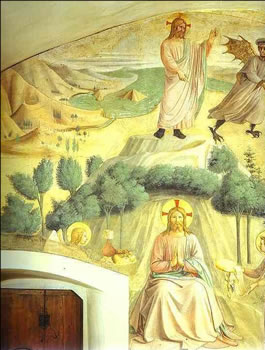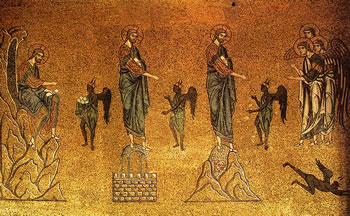Temptation and Testing:
Made Like Us in All Things
For Sunday February 17, 2013
First Sunday in Lent
Lectionary Readings (Revised Common Lectionary, Year C)
Deuteronomy 26:1–11
Psalm 91:1–2, 9–16
Romans 10:8b–13
Luke 4:1–13
A guest essay by Ron Hansen. Ron Hansen is the author of eight novels, including Desperadoes, The Assassination of Jesse James by the Coward Robert Ford, Mariette in Ecstasy, Exiles, and most recently A Wild Surge of Guilty Passion, as well as a children's book and A Stay Against Confusion: Essays on Faith & Fiction. Twice nominated for a PEN/Faulkner Award, he was a finalist for the National Book Award for his novel Atticus, and is a recipient of an Award in Literature from the American Academy and Institute of Arts and Letters. Scribner published his She Loves Me Not: New and Selected Stories in November. Married to the novelist Bo Caldwell, Ron is Director of Creative Writing at Santa Clara University, where he is the Gerard Manley Hopkins, S.J. Professor in the Arts and Humanities.
 |
In Luke’s gospel, the baptism of Jesus is followed by a genealogy (3:21-38) that traces his supposed fatherly lineage back to “son of Enos, son of Seth, son of Adam, son of God.” And then, full of the Holy Spirit, he leaves the river Jordan for forty days in the Judean desert in order to be tested by the devil [here diabolos].
Weakened by hunger, Jesus is first prompted to exercise his divine power by turning a stone into bread. Refusing that parlor trick with a citation from the Book of Deuteronomy (8:3), Jesus is then taken higher, given a vision of all the glories and empires of the inhabited world, and is told all he surveys will be his if he pays fealty and homage to the evil one. Citing the Book of Deuteronomy again (6:13), Jesus rejects the invitation, saying he will serve only God. And so the devil spirits him from the wilderness to the holy city of Jerusalem. There he tempts Jesus to prove his faith in God by leaping from the highest pinnacle of the temple with the conviction that God will preserve his son. And when Jesus scorns the devil with Deuteronomy 6:16, “Do not put the LORD your God to the test,” the devil departs from him “for a time.”
Early Jewish hearers of the gospel narrative would have connected the forty days of Jesus’s retreat with the forty days that Elijah wandered hungry in the wilderness, the forty days and nights that Moses fasted before etching the ten commandments, and the forty years that the former Egyptian slaves wandered in the desert before reaching the Promised Land.
Hellenistic hearers would have connected the three temptations with their threefold categories of vice: the love of pleasure, the love of possessions, and the love of glory.
 |
And it is a tradition in Christianity that Jesus lay dead in his tomb for forty hours before he was resurrected on Easter.
But we do not see the glorified Jesus in our gospel account today. Instead we find a thirty-year-old carpenter’s son who is at a crossroads in his life and is most decidedly vulnerable and human.
Up until his baptism when the heavens opened and he heard, “You are my Son, the Beloved, with you I am well pleased,” Jesus may have had no knowledge of his miraculous conception, the wonders that accompanied his birth, nor the messianic predictions of Simeon at the infant’s presentation in the temple. Recall that chapter 2 in the Gospel of Luke concluded with Mary and Joseph finding the boy Jesus in the temple and Jesus telling them he needed to be in his Father’s house. And “His mother treasured all these things in her heart.” Could that mean she thought it more psychologically healthy for the boy Jesus if she were silent about his heavenly origin? Could it be that his first stunning realization that he was truly the Son of God occurred at his baptism by John, and Jesus needed the solitude and prayer of forty days in the desert to emotionally come to terms with that revelation?
The Jesus we see in the wilderness is very much like us. We all know there need not have been an external tempter or evil spirit to be distraught and torn by just such tormented interior questioning and self-doubt. We stew over our choices. We fight dejection with every failure; we fight vainglory with every achievement; we are subject to all the seven deadly sins. And the Jesus of this gospel passage can relate to that; he can sympathize.
 |
In most Christian denominations, Lent concludes with Holy Thursday and the final supper with his disciples in which the inner meaning of Jesus’s gift of himself is revealed. Afterward Jesus and the eleven left the Upper Room for the Mount of Olives where Jesus underwent a fierce testing of his faith and obedience as the evil spirit that departed from Jesus “for a time” in the wilderness tempted him again.
The Wednesday prior to Holy Thursday is generally called Spy Wednesday because of its assignment as the night when Judas Iscariot conspired with the Sanhedrin to betray the Son of God for thirty silver coins. We have no certain idea of his motivations but we can imagine Judas being tempted by one or all of the threefold categories of vice: the love of pleasure, the love of possessions, and the love of glory. And he failed the test.
The Jesus we find in the wilderness is one who teaches us how to respond to temptation with his focused prayer, his fidelity to biblical instruction, and his perfect obedience to his Father.
Image credits: (1–3) Ron Hansen.





